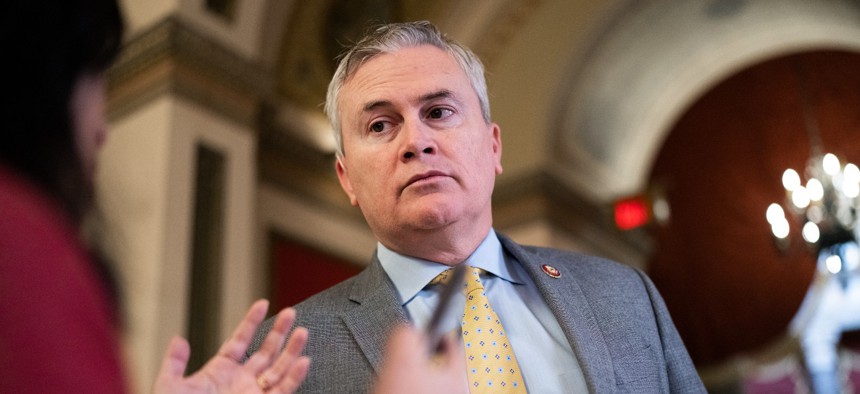
Rep. James Comer, R-Ky., prepares for a television interview in the U.S. Capitol on Jan. 12, 2023. Comer was selected to take the helm of the House Oversight and Accountability Committee in December. Tom Williams/CQ-Roll Call, Inc via Getty Images
Oversight Republicans Demand Answers from OPM on FEHBP Fraud Risk Report
House Oversight and Accountability Chairman James Comer claimed, without evidence, that the insurance program for federal employees is “riddled” with ineligible participants.
Republicans on the House Oversight and Accountability Committee are demanding documents and a briefing from the Office of Personnel Management related to recent government watchdog concerns that the agency isn’t doing enough to minimize the risk of fraud in the federal workforce’s health insurance program.
Earlier this month, the Government Accountability Office released a report on fraud risk within the Federal Employees Health Benefits Program where it found that although OPM has taken some steps in 2018 to check the eligibility of federal employees and family members enrolled in the insurance plan, more must be done. The lack of a comprehensive way to guard against continued enrollment of ineligible dependents, such as divorced spouses or children who have aged out of their parents’ insurance coverage, could be costing the government between $360 million and $1 billion per year, GAO found.
In a letter to OPM Director Kiran Ahuja on Monday, Committee Chairman James Comer, R-Ky., claimed without evidence that the GAO report revealed FEHBP to be “riddled” with ineligible participants. The report claimed only that there is an unmeasured risk of fraud through coverage of ineligible participants.
“GAO estimates that ‘the program may be spending up to $1 billion per year on payments for ineligible members,’” Comer wrote. “This is a flagrant waste of funds and may be driving up premium costs for eligible participants.”
Comer specifically called out the fact that it was not until 2018 that OPM instituted measures to require employing agencies and insurance providers to check participants’ eligibility for the program, although that policy only applies to certain enrollments.
“To this day, according to GAO, ‘OPM does not plan to establish a monitoring mechanism to identify and remove ineligible family members who already have FEHB coverage,’” he wrote. “Making matters worse, GAO determined OPM’s annual fraud risk assessment of the FEHB program fails to cover ‘fraud risks associated with ineligible members in the program.’”
OPM did not immediately respond to a request for comment Monday. In its response to GAO investigators, officials said efforts to audit all 8 million people covered by FEHBP to confirm their eligibility would cost too much for the agency to undertake, given their funding level from Congress. The agency is in the process of developing and pursuing funding for an initiative to centralize the enrollment process across government, although current plans do not include a system to monitor enrollee eligibility.
In his letter, Comer asked OPM to provide documents related to the 2018 regulations that tasked agencies with reviewing some FEHBP enrollments for dependents’ eligibility, any documentation related to improper payments within the program or how those payments could have contributed to rising premiums. He also asked for the agency to brief committee staff on how officials plan to comply with GAO’s recommendations to improve monitoring of fraud risk and ineligible FEHBP enrollees.
NEXT STORY: Employee and Retiree Benefits Changes for 2023







